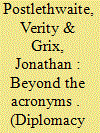| Srl | Item |
| 1 |
ID:
146050


|
|
|
|
|
| Summary/Abstract |
Diplomacy often finds itself reduced to actions centred on states. However, after the Cold War, international relations and diplomacy have expanded with different actors growing into significant roles, particularly in the increase of diplomatic relations in the context of sport. The classification and significance of other actors remains under-researched in relation to sport, with literature focusing more on the growth of new and varying practices of diplomacy. This analysis contends that there is a need to interrogate fundamental components of modern diplomacy—with the actor being the focus—more specifically the classification of sports organisations in diplomacy. It is relevant as a more accurate understanding of sports organisations will contribute to how diplomatic studies can analyse and evaluate modern diplomacy within the context of sport. The International Olympic Committee is the actor used to illustrate how problematic classifications currently in the academic literature translate into weak and reduced analysis and evaluation of its role and significance in diplomacy. As counterpoint, this analysis proposes an analytical framework of socio-legal theory that harnesses legal regulation as a benchmark to classify an actor’s capacity within a society. In consequence, the IOC is as an active and significant contributor to the ever expanding and complex diplomatic environment and wider society.
|
|
|
|
|
|
|
|
|
|
|
|
|
|
|
|
| 2 |
ID:
105407


|
|
|
|
|
| Publication |
2011.
|
| Summary/Abstract |
Despite the relative novelty of the contemporary sport-for-development movement, instrumentalising sport for purposes of human and collective development is nothing new. The International Olympic Committee's (ioc) belated efforts to play a leadership role in this movement is ironic, given its 117-year commitment to placing sport at the service of world-cultural ideals of progress, equality, development, modernisation and international understanding. The ioc's behaviour is best understood with reference to the institutional environments it has inhabited. Rather than adapting primarily because of ineffectiveness, the ioc has changed the meanings of its social interventions (often unwittingly) in order to secure legitimacy among its institutional peers and other exogenous actors in world politics (eg states, activist organisations, etc). Reinventing itself in accordance with evolving world-cultural preferences allows it to survive and have a measure of power. Three historical periods are reviewed to illustrate how the social purposes of the Olympic movement have adapted to account for changes in the ioc's institutional environment. Its recent embrace of the sport-for-development movement is merely its latest reinvention.
|
|
|
|
|
|
|
|
|
|
|
|
|
|
|
|